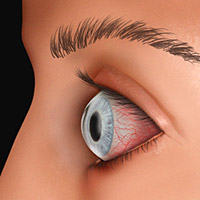 The natural tears that your eyes produce are composed of three layers:
The natural tears that your eyes produce are composed of three layers:
- The outer oily layer
- The middle watery layer
- The inner mucus layer
Dry eye is the term used to describe eyes that do not produce enough tears or tears with the proper chemical composition in any of these layers.
Dry eye is most often a result of eyes’ natural aging process. Most peoples’ eyes tend to become drier as they age, but the degree of dryness varies and some people have more problems than others. In addition to age, dry eye can result from:
- Problems with normal blinking
- Certain medications like antihistamines, oral contraceptives and antidepressants
- Environmental factors like a dry climate and exposure to wind
- General health problems like arthritis or Sjogren’s syndrome
- Chemical or thermal burns to the eye
Dry eye symptoms are often different in different people, but those whose tear production is inadequate commonly experience the following:
- Irritated, scratchy, dry or uncomfortable eyes
- Redness of the eyes
- A burning sensation of the eyes
- A feeling of a foreign body in the eye
- Blurred vision
- Excessive watering as the eyes try to comfort an overly dry eye
- Eyes that seem to have lost the normal clear glassy luster
If untreated, dry eye can be more than just irritating or uncomfortable.
Excessive dry eye can damage eye tissue and possibly scar the cornea, the transparent front covering of the eye, impairing vision. Contact lens wear may be more difficult due to the possibility of increased irritation and a greater chance of eye infection.
If you are experiencing the symptoms of dry eye, your doctor of optometry can perform “dry eye” tests using diagnostic instruments to give a highly magnified view and special dyes to evaluate the quality, amount and distribution of tears. Your optometrist will also need to know about your every day activities, your general health, medications you are taking and about environmental factors that may be causing your symptoms.
Unfortunately, dry eye cannot be cured, but your eye’s sensitivity can be lessened and treatment prescribed so that your eyes remain healthy and your vision is not affected. Possible treatments include:
- Frequent blinking to spread tears over the eye, especially when using a steady focus for an extended period
- Changing environmental factors like avoiding wind and dust and increasing the level of humidity.
- Using artificial tear solutions
- Using moisturizing ointment, especially at bedtime
Other forms of treatment:
- Insertion of small plugs in the corner of the eyes to slow drainage and loss of tears.
- In rare cases, surgery may be recommended
Whatever treatment is prescribed for you. It is very important that you follow your doctor of optometry’s instructions carefully. Dry eye does not go away, but by working together you and your doctor ca n keep your eyes healthy and protect your good vision.